

D2 vs. D3: Why Mushroom Vitamin D Content Is a Huge Scam. Guess what, it’s your lucky day!

We at Superfoodly would like to give you $1,000* for free. Aren’t you excited? Then you see the fine print… *in the form of Monopoly money. Vitamin D supplements do not reduce the risk of cancer or cardiovascular disease. Vitamin supplements are a triumph of marketing over evidence, where sales continue to grow despite the evidence that they are neither necessary nor beneficial for the majority of people that take them.
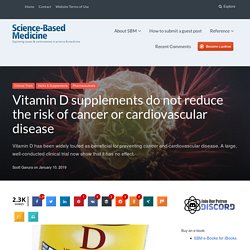
There are absolutely cases where vitamins are beneficial, however. While medically significant deficiencies of vitamins are generally rare in developed countries (you don’t see scurvy much anymore), dietary restrictions, pregnancy, and even socio-economic status may increase the possibility of a deficiency, and supplementation may be evidence based. It’s more of an open question if supplementation in the absence of any clear medical need is advisable or necessary.
As a pharmacist I have spent a lot of time “in front of the counter” discussing the merits of vitamin supplements and trying to convince people that more is not necessarily better. VITAL answers Results Discussion. Can You Take Too Much Vitamin D Supplement? While there’s good reason to prioritize getting enough vitamin D — considering vitamin D deficiency symptoms can include a weakened immune system, autoimmune diseases and hypertension — it’s still potentially possible to get too much vitamin D.
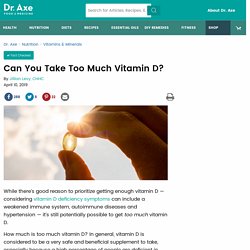
How much is too much vitamin D? In general, vitamin D is considered to be a very safe and beneficial supplement to take, especially because a high percentage of people are deficient in this important vitamin. Yet “vitamin D toxicity” can occur when taking high doses upward of 10,000 to 40,000 international units per day for several months or longer, according to the Vitamin D Council. What are the effects of too much vitamin D? As covered more below, signs of too much vitamin D can include frequent sickness, fatigue and weakness, digestive issues and muscle/bone pain. A naturopath perspective on the research behind vitamin D efficacy.
You may have noticed that Vitamin D, the ‘sunshine vitamin’, has been in the news lately.
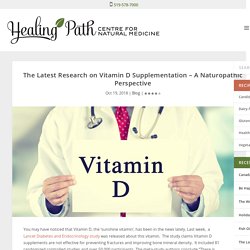
Last week, a Lancet Diabetes and Endocrinology study was released about this vitamin. The study claims Vitamin D supplements are not effective for preventing fractures and improving bone mineral density. It included 81 randomized controlled studies and over 50,000 participants. The meta-study authors conclude “There is little justification to use vitamin D supplements to maintain or improve musculoskeletal health”. The media articles about the study have been interesting.
Dminder - Apps on Google Play. Those with larger waistlines may have a higher risk of vitamin D deficiency. Image: Oktay Ortakcioglu/Istock.com via AFP Relaxnews New European research has found that individuals who carry more fat around their belly, especially those who are already obese, show lower levels of vitamin D and may have a higher risk of being deficient in this important vitamin.
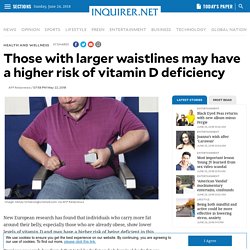
Previous research has found that total body fat and abdominal body fat are risk factors for a vitamin D deficiency. However, it is unclear which has a greater effect on vitamin D levels. To investigate further, researchers at the VU University Medical Center and Leiden University Medical Center in the Netherlands looked at thousands of male and female participants aged between 45 and 65 years. After taking into account factors such as age, chronic diseases, smoking, alcohol consumption and physical activity, the team found that in women the levels of both total and abdominal fat were associated with lower vitamin D levels, although abdominal fat had a greater impact.
Forget Vitamin D; Why Infrared Light Explains Many of the Benefits of Sunlight – The Hammer of Health. The practice of “heliotherapy” or the use of light (generally sunlight) to produce health benefits dates back as far as Hippocrates, who is said to have recommended sunlight exposure for medical purposes.
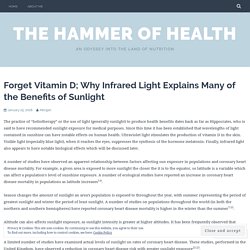
Since this time it has been established that wavelengths of light contained in sunshine can have notable effects on human health. Ultraviolet light stimulates the production of vitamin D in the skin. Visible light (especially blue light), when it reaches the eyes, suppresses the synthesis of the hormone melatonin. Finally, infrared light also appears to have notable biological effects which will be discussed later. A number of studies have observed an apparent relationship between factors affecting sun exposure in populations and coronary heart disease mortality.
Season changes the amount of sunlight an area’s population is exposed to throughout the year, with summer representing the period of greatest sunlight and winter the period of least sunlight. References: 1. Like this: Cod Liver Oil. The Ultimate Guide to Vitamin D. VitaminDWiki. Vitamin D Council. Vitamin D is Synthesized From Cholesterol and Found in Cholesterol-Rich Foods.
May 25, 2006 by Chris Masterjohn (Please also see my more recent and extensive article, From Seafood to Sunshine: A New Understanding of Vitamin D Safety, as well as my article on vitamin D nutrition during pregnancy and lactation, Vitamin D in the Infant: Requirements and Safety.
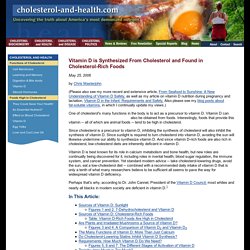
Also please see my blog posts about fat-soluble vitamins, in which I continually update my views.) An Ancestral Perspective on Vitamin D Status, Part 1: Problems With the "Naked Ape" Hypothesis of Optimal Serum 25(OH)D. An Ancestral Perspective on Vitamin D Status, Part 2: Why Low 25(OH)D Could Indicate a Deficiency of Calcium Instead of Vitamin D. Vitamin D Revisited. On November 20, 2012 at 7:30 am Recently a few articles and studies have come to my attention that have expanded my understanding of vitamin D metabolism, and raised a few questions as well.
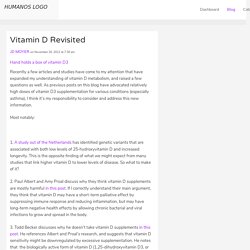
As previous posts on this blog have advocated relatively high doses of vitamin D3 supplementation for various conditions (especially asthma), I think it’s my responsibility to consider and address this new information. Most notably: 1. Don't Supplement with Vitamin D. Supplementing with Vitamin D may be dangerous.

Yeah I said it. Like many phases in nutritional science, there is a frenzy right now over a particular nutrient, and it’s got millions of people all over the world downing this substance willy nilly. The stuff is even added to milk for crying out loud. Vitamin D - Problems With the Latitude Hypothesis. Vitamin D Supplementation: Panacea or Potential Problem?
Mixed Findings In Vitamin D Supplement Studies – Lacto Bacto. Vitamin D: More Is Not Better. Surprising New Vitamin D Research, The Myth of Multi-tasking, and How The Internet is Rewiring Our Brains. Vitamin D is not a Substitute for Sunshine. Marathon Drugs Increases Price 70-Fold – 2/10/17 More predation by pharma.
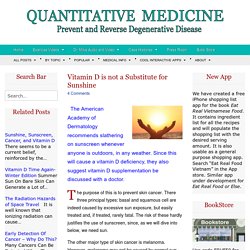
Marathon has gotten a decades old muscular dystrophy drug, deflazacort, approved and is charging $89,000 a year for it. It’s price in Europe is under $1500/year. Where are the free market forces? Why aren’t our elected officials protecting us from this egregious practice? Lowest Stroke Rates in Older Baby Boomers; Younger People Rising– 9/12/16 reports the American Heart Association, here. Sugar Lobby Promotes Sugar– 11/13/16 Surreal. Zika Breakthrough– 8/30/16 Reported here and elsewhere, two existing (already approved) drugs appear to be effective against Zika.
AHA Limits Added Sugar– 8/17/16 A sensible recommendation from the American Heart Association limits sugar for children aged 2-18 to fewer than 6 teaspoons a day. Calcium Supplements Linked to Dementia– 8/17/16 A report in the journal Neurology, here, links calcium supplements to dementia in some groups of women. Big Pharma to World: Take Something! 3 Reasons to Re-Think Vitamin D Supplementation.
Why I don’t take vitamin D supplements / Getting Stronger. Vitamin D has been associated with numerous health benefits, including cardiovascular and immune health, bone strength, and prevention of cancer. However, studies claim that most of us are deficient in vitamin D, and thereby unnecessarily vulnerable to increased heart disease, stroke, cancer, diabetes, osteoporosis, infection and autoimmune disorders. According to a review of recent studies in Natural News, there is a woldwide epidemic of vitamin D deficiency: 59% of the population is “vitamin D deficient”.
The article goes onto to speculate that “What’s becoming increasingly clear from all the new research is that vitamin D deficiency may be the common denominator behind our most devastating modern degenerative diseases.” We can’t all bask in the midday sun.. For those of us unable to run shirtless and shoeless through a sun kissed meadow…our option is oral intake… food will help, but it won’t suffice.
An alternative to vitamin D supplements? / Getting Stronger. My recent post on Why I don’t take vitamin D supplements generated a lot of interest and a few misconceptions. In that article, I did not suggest any practical alternatives to taking high dose vitamin D supplements. Here I will suggest a way that may provide the benefits of vitamin D without popping any pills, spending all day in the sun, or ingesting copious amounts of fish.
Some readers got the idea that I believe vitamin D is not beneficial, and that I discount the evidence from studies that show the benefits. I want to dispel that notion. From Seafood to Sunshine: A New Understanding of Vitamin D Safety - The Weston A. Price Foundation. Low Levels Of Vitamin D In Patients With Autoimmune Disease May Be Result, Not Cause, Of The Disease. Deficiency in vitamin D has been widely regarded as contributing to autoimmune disease, but a review appearing in Autoimmunity Reviews explains that low levels of vitamin D in patients with autoimmune disease may be a result rather than a cause of disease and that supplementing with vitamin D may actually exacerbate autoimmune disease. Authored by a team of researchers at the California-based non-profit Autoimmunity Research Foundation, the paper goes on to point out that molecular biologists have long known that the form of vitamin D derived from food and supplements, 25-hydroxyvitamin D (25-D), is a secosteroid rather than a vitamin.
Like corticosteroid medications, vitamin D may provide short-term relief by lowering inflammation but may exacerbate disease symptoms over the long-term. Is Vitamin D Safe? Still Depends on Vitamins A and K! Testimonials and a Human Study. Are Some People Pushing Their Vitamin D Levels Too High? Is Your Chronically Low Vitamin D Due to an Infection? Chronically Low Vitamin D - The Infection Connection. Update on Vitamins A and D. How and Why to Balance Fat-Soluble Vitamins – J.D. Moyer. New Evidence of Synergy Between Vitamins A and D: Protection Against Autoimmune Diseases - The Weston A. Price Foundation. Is Vitamin D Safe? Still Depends on Vitamins A and K! Testimonials and a Human Study - The Weston A. Price Foundation. New Evidence of Synergy Between Vitamins A and D: Protection Against Autoimmune Diseases. Low Magnesium Linked to Poor Vitamin D Status. 3 Ways to Lower PTH Levels Naturally. Vitamin D supplementation in primary hyperparathyroidism, not a bad idea?
You and Your Hormones from the Society for Endocrinology. Alternative names for parathyroid hormone PTH; parathormone; parathyrin What is parathyroid hormone? The parathyroid glands are located in the neck, just behind the butterfly-shaped thyroid gland. Parathyroid hormone is secreted from four parathyroid glands, which are small glands in the neck, located behind the thyroid gland. Parathyroid hormone regulates calcium levels in the blood, largely by increasing the levels when they are too low. Bones – parathyroid hormone stimulates the release of calcium from large calcium stores in the bones into the bloodstream. How is parathyroid hormone controlled? Parathyroid hormone is mainly controlled by the negative feedback of calcium levels in the blood to the parathyroid glands. What happens if I have too much parathyroid hormone? A primary problem in the parathyroid glands, producing too much parathyroid hormone causes raised calcium levels in the blood (hypercalcaemia) and this is referred to as primary hyperparathyroidism.
Last reviewed: Feb 2018. Mastering Nutrition 9: Balancing Calcium and Phosphorus in the Diet, and the Importance of Measuring Parathyroid Hormone (PTH) What if my vitamin D is normal, but my PTH is high?